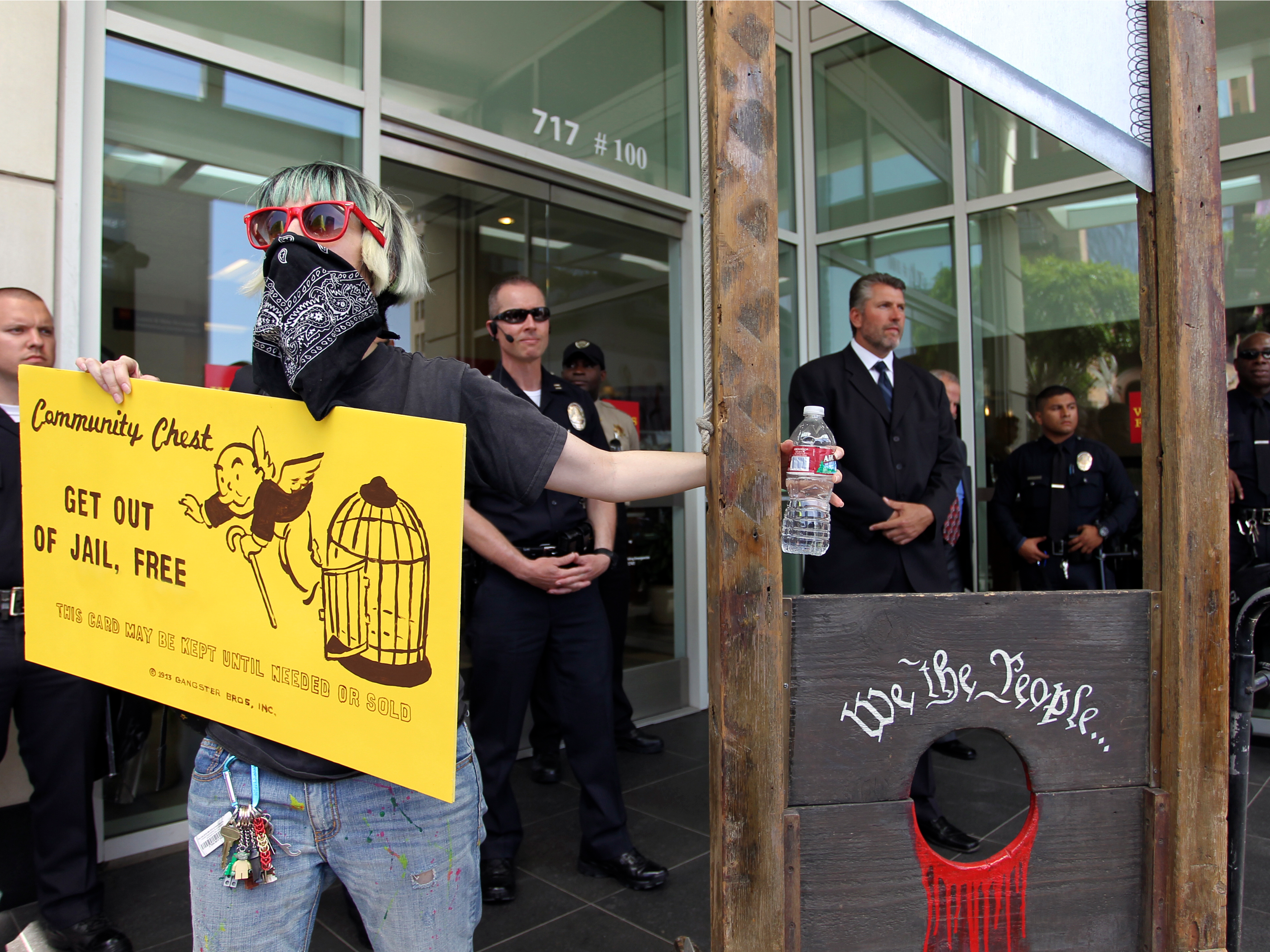- Paul Constant is a writer at Civic Ventures, a cofounder of the Seattle Review of Books, and a frequent cohost of the “Pitchfork Economics” podcast with Nick Hanauer.
- The guillotine and calls to “eat the rich” serve as symbols of the dissatisfaction many feel over our rigged economic system.
- Darren Walker, the president of the Ford Foundation, said that philanthropy currently serves as a Band-Aid, but should be used to address systemic problems of racism and poverty and injustice.
- For more on this topic, listen to the latest episode of “Pitchfork Economics.”
- Visit Business Insider’s homepage for more stories.
Earlier this month, a Democratic candidate for Senate unveiled a controversial piece of campaign merchandise. Bre Kidman, a long-shot contender for the Maine Senate seat currently occupied by unpopular Republican Susan Collins, tweeted out a t-shirt with a guillotine prominently displayed above the campaign logo. Kidman, who uses they/them pronouns, announced that the guillotine shirts would be given out to campaign volunteers and were not for sale.
When questioned by the Portland Press Herald’s Rachel Ohm, Kidman said that the guillotine was not a call to violence against the wealthy. Rather, they said, the t-shirts recall “what people have done for revolution before,” while also offering “a symbol of the work we have to do to overcome flaws in our system.”

Kidman isn’t silk-screening t-shirts in a vacuum: Guillotine and pitchfork imagery have proliferated online since the Trump tax cuts pushed income inequality to the forefront of political conversations. Search for “eat the rich” on Twitter and you’ll find hundreds of new jokes, memes, and conversations every day. The wealthiest 1% of all Americans, of course, have suddenly become very concerned about the lack of civility in the public discourse – some even openly weeping on live television about “the vilification of billionaires.”
But all the talk of guillotines and pitchforks and eating the rich is just that - talk. It's a symbol for the very real dissatisfaction that a large and growing number of Americans feel for our rigged economic system in which wealth gushes upward to the top and nothing trickles back down toward the rest.
Why isn't this unrest manifesting itself in the form of real revolution? The pitchforks are out in the form of mass protests in Hong Kong and Chile and other hotspots around the globe, but the United States still hasn't seen an uprising by the poor. But in America, the guillotines are still just an edgy fashion statement.
Pundits on Fox News and in other conservative media organizations have made the argument that poor people in America enjoy enough "luxuries" like refrigerators and smartphones that they don't feel the desperation that impoverished people in Chile do. It's a disingenuous argument which ignores the fact that the actual tools of economic growth - housing, education, and health care - are far too expensive for Americans at the bottom of the income scale.
I've written here in the past about how corporate philanthropy often masks the worst institutional sins of big business. Another "benefit" of charitable giving is that it might be keeping the pitchforks at bay. After 40 straight years of shredding the social safety net provided by the federal government, trickle-downers are now providing their own patchwork social services programs through philanthropy. These corporate handouts - which are miniscule compared to the taxes we would be collecting had our 1970s tax code still been in place today - might be the last bulwark the one percent has against a genuine revolution.
On this week's episode of "Pitchfork Economics," Nick Hanauer talks with Darren Walker, the president of the Ford Foundation, about the limits of philanthropic giving. It would be easy for Walker to bask in the adulation of business-friendly media: He's the head of one of the most widely known philanthropic organizations in the country - one which gives out some $600 million in grants each year.
But in his new book "From Generosity to Justice: A New Gospel of Wealth," Walker criticizes the American philanthropic system for being nothing more than a Band-Aid on the open wound of American poverty. He argues that it's time to stop merely trying to staunch the symptoms of our war on the poor. Instead, he calls for philanthropy to cure the larger systemic problems of racism and poverty and injustice.
Walker has chosen an uphill battle. Why would your typical tax-dodge philanthropic foundation choose the difficult and complex task of criminal justice reform over the media-friendly narrative of providing shiny new laptops for children in poor school systems? The answer is simple: No child in American schools should ever go without a good laptop, and we should be taxing wealthy Americans and their corporations at a rate that pays for a world-class education system.
Right now, all these scams of corporate reputation-washing are holding together a baseline that impoverished Americans need to survive. But the tent cities sprouting up around urban areas in red and blue states are proof that too many people are falling through the giant holes in that safety net. If those holes grow much bigger, the revolution might not just be a trending topic on Twitter.
Philanthropy as we know it is a meager handout that the wealthiest Americans are tossing to the poorest Americans in exchange for a relatively calm status quo. But thinkers like Walker see a more active and inspiring use for philanthropy - a way to improve outcomes for everyone. As Kidman told the Portland Press Herald, the idea behind their guillotine campaign t-shirt wasn't about spilling the blood of the rich. It was about inclusion.
"I think we have to find ways that open the doors to getting more people at the table," Kidman said.

